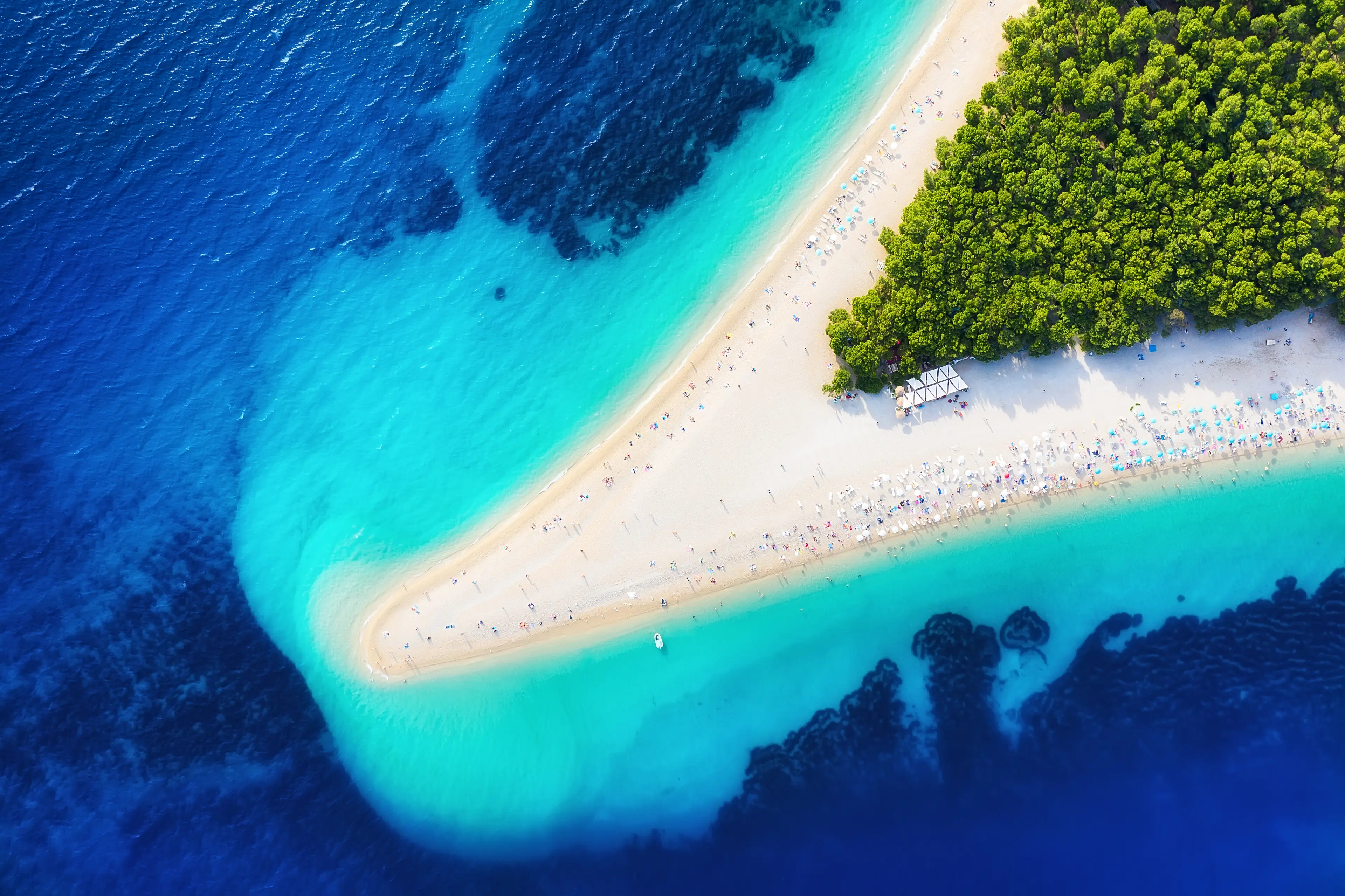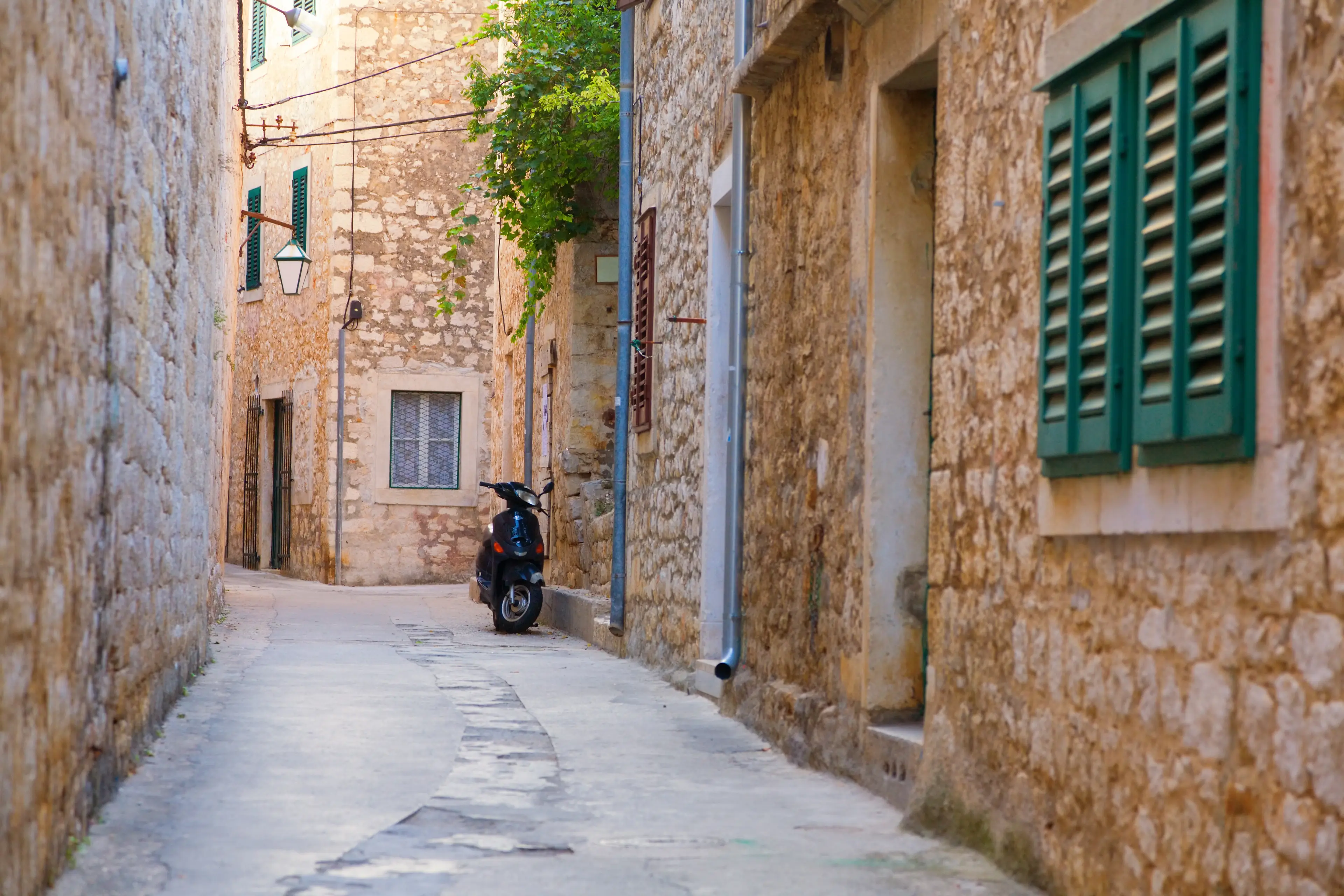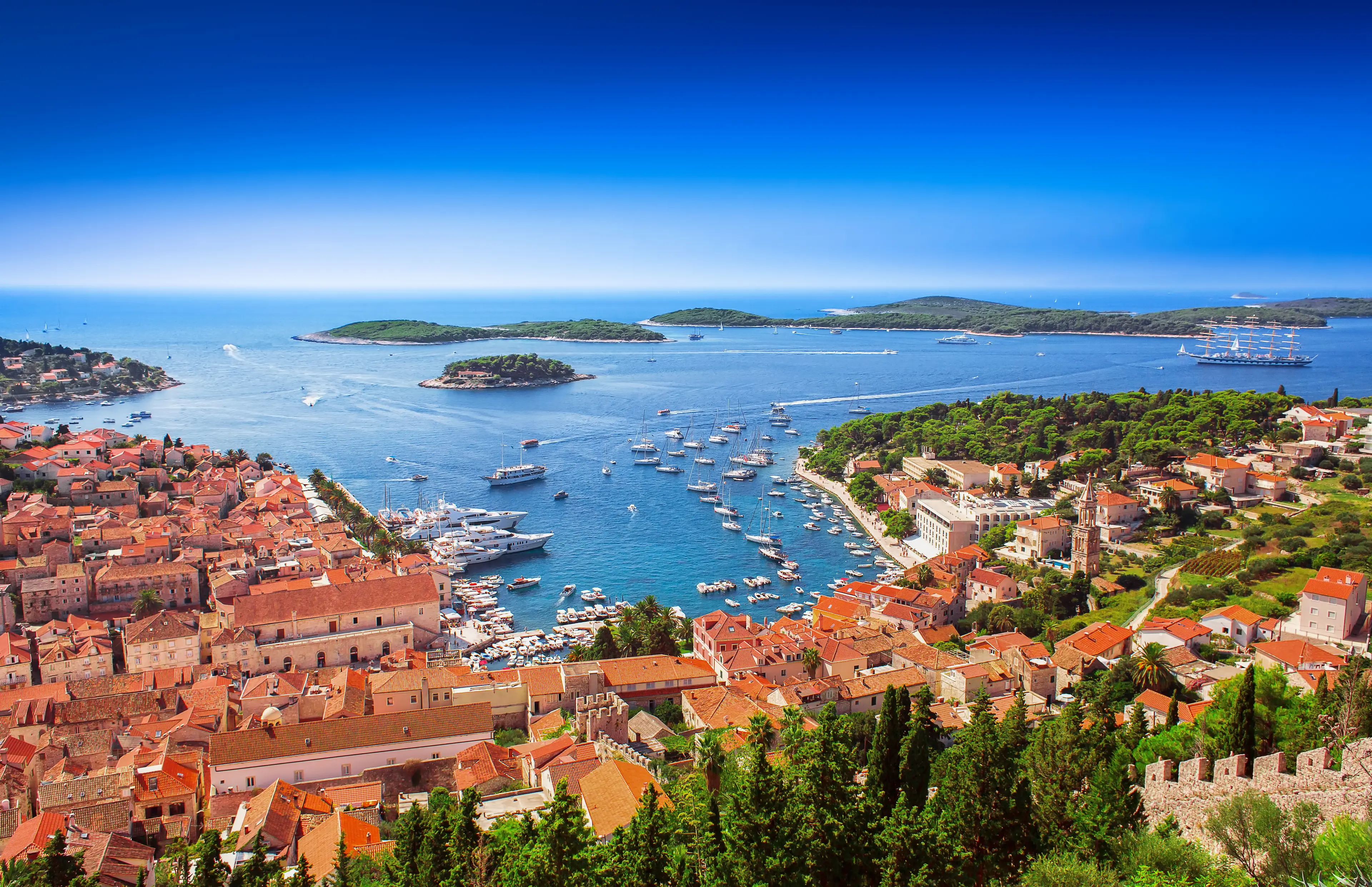2-Day Local Experience in Hvar: Family Adventure with Food & Wine
Hvar, Croatia
2 days





About Hvar, Croatia
Discover the enchanting island of Hvar, Croatia, a Mediterranean paradise known for its sunny weather, stunning lavender fields, and crystal-clear waters. Explore the rich history of Hvar Town, with its 13th-century walls, hilltop fortress, and the oldest public theater in Europe. Enjoy the vibrant nightlife, world-class restaurants, and luxury hotels. Venture to the tranquil eastern end of the island for a taste of authentic Dalmatian life in the quaint fishing villages. Indulge in local delicacies like fresh seafood and fine Hvar wines. For the adventurous, there's sailing, diving, and hiking through the scenic landscapes. Hvar's unique blend of glamour and tradition makes it a must-visit destination.
2-Day Itinerary
Day 2
Discovering the Historical and Cultural Riches of Stari Grad
Morning
Start your second day with a visit to the Stari Grad Plain. This UNESCO World Heritage Site is a cultural landscape that has remained practically intact since it was first colonized by Ionian Greeks from Paros in the 4th century BC.
Lunch
Enjoy a picnic lunch in the Stari Grad Plain. Pack some local cheeses, olives, and bread from the Farmer's Market, and enjoy a meal amidst the olive groves and vineyards.
Afternoon
After lunch, explore the town of Stari Grad. Visit the Tvrdalj Castle, the Dominican Monastery, and the Stari Grad Museum. Each of these sites offers a glimpse into the rich history and culture of Hvar.
Dinner
For your final dinner, visit a local seafood restaurant. Enjoy fresh fish, shellfish, and other seafood delicacies, all caught locally and prepared in traditional Croatian style.
Evening
End your trip with a leisurely walk along the Stari Grad Riva. The peaceful waterfront promenade is the perfect place to reflect on your trip and enjoy the beauty of Hvar one last time.
Attractions in Itinerary (6)

1Hvar's Farmer's Market
A bustling market where local farmers sell their fresh produce. A great place to experience the local culture and cuisine.

2Hvar Fortress
Also known as Fortica, this fortress offers breathtaking views of Hvar and the Pakleni Islands. It's a historical site that dates back to the 16th century.

3Stari Grad Plain
A cultural landscape that has remained practically intact since it was first colonized by Ionian Greeks from Paros in the 4th century BC. It's a UNESCO World Heritage site.

4Tvrdalj Castle
The well-preserved summer residence of the poet Petar Hektorović. It's known for its beautiful garden, fishpond, and inscriptions in Latin and Croatian.

5Dominican Monastery
A historic monastery dating back to the 15th century, featuring a museum with a collection of artworks and a beautiful garden.

6Stari Grad Museum
Located in a Renaissance palace, the museum showcases the history and culture of Stari Grad and Hvar Island through various exhibits.
Local Food and Drinks (12)

Gregada
A traditional fish stew of Hvar, made with onions, potatoes, garlic, parsley, and white wine.

Peka
A popular Croatian dish, typically made with veal, lamb or octopus, along with vegetables, cooked under a bell-like dome in an open fire.

Pršut
Croatian dry-cured ham similar to Italian prosciutto, a must-try delicacy in Hvar.

Pašticada
A slow-cooked beef dish marinated in garlic, cloves, and red wine, served with gnocchi. It's a traditional Dalmatian dish, popular in Hvar.

Crni Rižot
A black risotto made with cuttlefish or squid, rice, garlic, red wine, and olive oil. It's a common dish in Hvar and other parts of Croatia.

Rožata
A traditional Croatian dessert similar to flan or crème caramel, often flavored with rose liqueur, which is a specialty in Hvar.

Fritule
Small doughnut-like fried pastries, often flavored with rum and citrus zest, a popular sweet treat in Hvar.

Brudet
A fish stew made with several types of fish, onions, tomatoes, and spices. It's a traditional dish in Hvar and other coastal areas of Croatia.

Soparnik
A savory pie filled with Swiss chard, onions, and parsley. It's a traditional Dalmatian dish, commonly found in Hvar.

Prošek
A sweet dessert wine made from dried grapes, similar to Italian Vin Santo. It's a traditional wine of Hvar and Dalmatia.

Rakija
A strong fruit brandy popular in Hvar and throughout Croatia. It comes in various flavors, including plum (šljivovica), grape (loza), and honey (medica).

Plavac Mali
A red wine made from the Plavac Mali grape, which is grown in the vineyards of Hvar. It's one of the most famous Croatian wines.
Best time to visit
The best time to visit Hvar, Croatia is between June and September. During these months, the weather is warm and sunny, perfect for beach activities and exploring the island's natural beauty. The sea temperatures are also ideal for swimming. Additionally, this period offers numerous festivals and events for tourists to enjoy. However, it's worth noting that July and August are the peak tourist months, so if you prefer a less crowded time, consider visiting in June or September.
How to get around
Foot
Hvar is a small island and its towns are quite compact, making it easy to explore on foot. This is especially true for Hvar Town, where many of the attractions, restaurants, and shops are within walking distance.
Car
Renting a car is a convenient option if you plan to explore the island extensively. It offers the flexibility to travel at your own pace and visit remote areas. However, keep in mind that parking can be challenging in Hvar Town during peak season.
Scooter
Renting a scooter is a popular way to get around Hvar. It's ideal for short trips and allows you to easily navigate the island's winding roads. However, you should be comfortable with riding a scooter and aware of local traffic rules.
Bicycle
Cycling is another great way to explore Hvar, especially for active travelers. The island offers several cycling routes that pass through beautiful landscapes. However, be prepared for some hilly terrain.
Taxi
Taxis are readily available in Hvar, particularly in Hvar Town. They can be a convenient option for getting to and from your accommodation, especially if you have heavy luggage.
Boat
Boats are a common mode of transport in Hvar, especially for visiting the Pakleni Islands. There are regular taxi boats from Hvar Town, or you can rent a private boat for more flexibility.
Bus
There is a local bus service that connects Hvar Town with other parts of the island, such as Stari Grad and Jelsa. It's a cost-effective way to travel, but the schedule can be limited, especially outside of peak season.
Ridesharing
Ridesharing services, such as Uber, are available in Hvar. This can be a convenient and often cheaper alternative to traditional taxis. However, availability can vary, especially in less populated areas of the island.
Important information
Currency€ EUR
Time zoneUTC+1
Driving sideRight
Emergency phone112
Drinking waterYes
Power sockets
Voltage230 V
Things to know about Hvar, Croatia as a first time visitor
1
Hvar is a Croatian island in the Adriatic Sea, located off the Dalmatian coast.
2
The island enjoys a Mediterranean climate, with hot, dry summers and mild, wet winters. Average summer temperatures are around 81°F (27°C), while winter temperatures average around 50°F (10°C).
3
The local currency is the Croatian Kuna (HRK). Credit cards are widely accepted, but it's a good idea to carry some cash for smaller establishments or markets.
4
Croatian is the official language, but English is widely spoken, especially in tourist areas.
5
Hvar is known for its lavender fields, so consider buying some lavender products as souvenirs.
6
The island is also famous for its wine. Be sure to try the local varieties, especially the reds.
7
Hvar has a vibrant nightlife, particularly in Hvar Town. Be prepared for late nights if you enjoy partying.
8
The island is very safe, but as with any tourist destination, keep an eye on your belongings and be aware of your surroundings.
9
The tap water in Hvar is safe to drink, but bottled water is readily available if you prefer.
10
Hvar is a popular destination for yachting and sailing. Consider renting a boat for a day to explore the surrounding islands.
11
The island is quite hilly, so comfortable walking shoes are a must.
12
Public transportation is limited, so consider renting a car or scooter to explore the island.
13
Hvar has a relaxed dress code, but it's respectful to cover up when visiting churches or other religious sites.
14
Croatia is part of the European Union, but not the Schengen Area. Check visa requirements before you travel.
15
The peak tourist season is July and August. If you prefer a quieter visit, consider traveling in the shoulder seasons of May-June or September-October.
16
Hvar has a rich history, with influences from the Greeks, Romans, Venetians, and Austrians. Take some time to learn about the island's past.
17
The local cuisine is heavily influenced by Italian and Mediterranean flavors. Be sure to try dishes like 'peka' (meat or seafood cooked under a bell-shaped lid) or 'gregada' (a fish stew).
18
Hvar is home to several music festivals throughout the summer. Check the local event calendar before your visit.
19
The island has a slower pace of life. Embrace the 'pomalo' (take it easy) lifestyle and don't rush your visit.
20
Sunscreen is a must, as the sun can be quite strong, especially in the summer months.
Basic Croatian to know as a first time visitor
English phrase | Native phrase | Pronunciation | When to use it |
|---|---|---|---|
Hello | Bok | bohk | Greeting someone |
Goodbye | Doviđenja | doh-vee-jen-ya | Saying goodbye |
Please | Molim | moh-leem | Making a request |
Thank you | Hvala | hva-la | Expressing gratitude |
Yes | Da | dah | Agreeing or confirming |
No | Ne | neh | Disagreeing or denying |
Excuse me | Oprostite | oh-pro-stee-teh | Getting attention or apologizing |
I don't understand | Ne razumijem | neh rah-zoo-me-yem | When you don't understand something |
Do you speak English? | Govorite li engleski? | go-voh-ree-teh lee eng-les-kee | Asking if someone speaks English |
I'm sorry | Žao mi je | zhao mee yeh | Apologizing |
Where is...? | Gdje je...? | gdye yeh | Asking for directions |
Bathroom | Kupaonica | koo-pah-oh-nee-tsa | Looking for a bathroom |
Help | Pomoć | poh-mohch | In case of emergency |
Food | Hrana | hra-na | Looking for a place to eat |
Water | Voda | vo-da | Asking for water |
Beer | Pivo | pee-vo | Ordering a beer |
Wine | Vino | vee-no | Ordering wine |
How much does it cost? | Koliko to košta? | ko-lee-ko toh kosh-tah | Asking for the price |
I would like... | Želio bih... | zhe-lee-oh bee | Making a request |
Good night | Laku noć | lah-koo notch | Saying goodnight |
Packing List
Clothing
Lightweight clothing
Swimwear
Beach cover-up
Underwear
Socks
Comfortable walking shoes
Flip flops for the beach
Light jacket or sweater for cooler evenings
Sunglasses
Hat for sun protection
Toiletries
Travel-sized shampoo and conditioner
Body wash
Toothbrush and toothpaste
Deodorant
Razor
Sunscreen
After-sun lotion
Makeup and makeup remover
Personal hygiene items
Travel documents and essentials
Passport
Driver's license
Credit and debit cards
Cash in local currency
Travel insurance documents
Hotel and transportation reservation confirmations
Emergency contact information
Electronics and gadgets
Smartphone
Charger for smartphone
Headphones
Portable power bank
Camera
Memory card for camera
Adapter plug for European outlets
Miscellaneous items
Travel guidebook for Hvar
Map of Hvar
Reusable water bottle
Snacks for the journey
Beach bag
Beach towel
Travel pillow for the journey
Earplugs and eye mask
First-aid kit
Weather Conditions
Hvar, Croatia, is known for its Mediterranean climate, which means it experiences hot summers and mild winters. The island is one of the sunniest places in Europe, boasting over 2,700 hours of sunshine per year. If you're planning a summer trip, expect temperatures to range from 80°F to 90°F (27°C to 32°C). It's the perfect weather for beach activities, sailing, and exploring the island's vineyards. However, it's also the peak tourist season, so be prepared for crowds. Don't forget to pack your sunscreen, hats, and light clothing to protect yourself from the sun. Spring and autumn are also great times to visit Hvar. The temperatures during these seasons are usually between 60°F and 70°F (16°C to 21°C), which is comfortable for outdoor activities like hiking and sightseeing. These seasons are less crowded, and you can enjoy the island's beauty in relative peace. Winter in Hvar is mild, with temperatures rarely dropping below 50°F (10°C). However, keep in mind that many tourist facilities and restaurants may be closed during this off-peak season. Regardless of when you visit, it's always a good idea to check the local weather forecast before your trip. This will help you pack appropriately and plan your activities. Remember, the weather can sometimes be unpredictable, so it's always wise to be prepared for a change in conditions.
| Month | Hi / Lo (°C) | Weather Overview |
|---|---|---|
January | 15° / 6° | January is the coldest month in Hvar, but it's still relatively mild compared to other European destinations. It's a quiet time to visit, with fewer tourists and lower prices. |
February | 15° / 6° | February is still off-peak season in Hvar, with similar temperatures to January. It's a good time to visit if you prefer a quieter vacation. |
March | 18° / 9° | March sees a slight increase in temperature, marking the beginning of spring. The island starts to get busier towards the end of the month. |
April | 21° / 12° | April is a pleasant time to visit Hvar, with mild temperatures and blooming flowers. The Easter holidays can be a busy period. |
May | 25° / 16° | May is a great time to visit Hvar, with warm temperatures and plenty of sunshine. The island is lively but not as crowded as the summer months. |
June | 29° / 20° | June is the start of the peak season in Hvar, with hot temperatures and lots of sunshine. The island is bustling with tourists and there's a vibrant nightlife. |
July | 32° / 23° | July is the hottest month in Hvar, perfect for beach activities and water sports. The island is very busy, with numerous events and festivals taking place. |
August | 32° / 23° | August is equally hot as July, with high temperatures and lots of sunshine. It's the busiest month, so book accommodation and activities in advance. |
September | 28° / 19° | September is a fantastic time to visit Hvar, with warm temperatures and fewer crowds. The sea is still warm enough for swimming and water sports. |
October | 24° / 15° | October sees a drop in temperatures but it's still warm enough to enjoy outdoor activities. The island is quieter, making it a good time for a peaceful getaway. |
November | 20° / 11° | November is off-peak season in Hvar, with cooler temperatures and fewer tourists. It's a good time to explore the island's cultural and historical sites. |
December | 17° / 8° | December is a quiet month in Hvar, with mild temperatures and fewer tourists. It's a good time to enjoy the island's Christmas festivities. |
Did you know?
Places near by Hvar, Croatia

Split
A vibrant city known for its stunning architecture, including the Diocletian's Palace, and beautiful beaches.

Brac
Famous for the white-pebble beach Zlatni Rat (Golden Cape), Vidova Gora Mountain, and olive oil production.

Korcula
Known as 'Little Dubrovnik', Korcula is famous for its medieval squares, churches, palaces and houses, while its beaches and dense forest offer plenty of adventure.

Vis
The farthest inhabited island off the Croatian mainland, known for its fishing and naval history, as well as its local wines.

Makarska
A small city on the Adriatic coastline of Croatia, known for its beautiful beaches, seafront promenade, and nightlife.

Dubrovnik
Known as the 'Pearl of the Adriatic', this stunning city is famous for its Old Town, encircled with massive stone walls completed in the 16th century.

Trogir
A historic town and harbour on the Adriatic coast, known for its preserved old town, encircled by medieval walls.

Zadar
Known for the Roman and Venetian ruins of its peninsular Old Town, as well as the Sea Organ and the Greeting to the Sun.